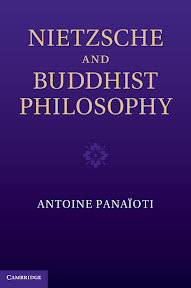Panaioti: Nietzsche and Buddhist Philosophy
Panaïoti, Antoine:
Nietzsche and Buddhist Philosophy / Antoine Panaïoti. - Cambridge : Cambridge University Press, 2013. - xiii, 244 S.
ISBN 978-1-10-703162-3
£ 55,00
DDC: 181.043; 193
Beschreibung
Nietzsche once proclaimed himself the 'Buddha of Europe', and throughout his life Buddhism held enormous interest for him. While he followed Buddhist thinking in demolishing what he regarded as the two-headed delusion of Being and Self, he saw himself as advocating a response to the ensuing nihilist crisis that was diametrically opposed to that of his Indian counterpart. In this book Antoine Panaïoti explores the deep and complex relations between Nietzsche's views and Buddhist philosophy. He discusses the psychological models and theories which underlie their supposedly opposing ethics of 'great health' and explodes the apparent dichotomy between Nietzsche's Dionysian life-affirmation and Buddhist life-negation, arguing for a novel, hybrid response to the challenge of formulating a tenable post-nihilist ethics. His book will interest students and scholars of Nietzsche's philosophy, Buddhist thought and the metaphysical, existential and ethical issues that emerge with the demise of theism. [Verlagsinformation]
Inhalt
Acknowledgments. viii
Note on translations, texts, and sources. x
Abbreviations. xii
Introduction. 1
PART I. NIHILISM AND BUDDHISM. 15
1. Nietzsche as Buddha. 17
2. Nietzsche as Anti-Buddha. 55
PART II. SUFFERING. 89
3. Amor Fati and the affirmation of suffering. 91
4. Nirvāṇa and the cessation of suffering. 132
PART III. COMPASSION. 171
5. Overcoming compassion. 173
6. Cultivating compassion. 193
Conclusion: Toward a new response to the challenge of nihilism. 212
Bibliography. 230
Index. 240
Autor
ANTOINE PANAÏOTI, Centre de recherche en éthique de l'Université de Montréal (CREUM). Profile page.
Quellen: Cambridge University Press; WorldCat; Blackwell's Bookshop; Amazon (UK); Library of Congress
Bildquelle: Cambridge University Press
Bibliographie: [1]
References
- (2013). Nietzsche and Buddhist Philosophy. xiii, 244 S.
Ähnlich
- Cross: Schopenhauer's Encounter with Indian Thought
- Todd: The Ethics of Śaṅkara and Śāntideva
- Steinkellner: Dharmakīrtis frühe Logik
- Schayer: Contributions to the Problem of Time
- Understanding Schopenhauer through the Prism of Indian Culture
- Schopenhauers Kompass
- Schopenhauer et la pensée indienne
- Schopenhauer's Philosophy of Religion
- Sucāruvādadeśika
- Harimoto: God, Reason, and Yoga

